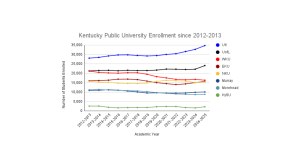WKU administration proposes tuition increase
May 10, 2018
The administration at WKU will propose an increase in tuition over the next fiscal year to the WKU Board of Regents tomorrow, May 11, during its meeting.
The administration is proposing a 3 percent tuition increase in undergraduate tuition, in addition to mandatory student fees, from the 2018 fiscal year to the 2019 fiscal year, according to the WKU Board of Regents proposed finance and budget plan.
Under this proposal, tuition for undergraduate military and non-military residents next year would increase from $5,101 to $5,256. They would increase for undergraduate non-residents from $12,756 to $13,140. They would increase for undergraduate international students from $13,080 to $13,464, and increase for undergraduate incentives from $6,744 to $6,876.
The proposed increase would also affect certain graduate students. Tuition for military and non-military resident graduate students next year would increase from $589 to $607, and tuition for non-resident domestic graduate students would increase from $873 to $899. The tuition for non-resident international students would decrease from $998 to $962 under this proposal. All graduate student tuition rates are per credit hour.
Under the administration’s proposed budget plan for next year, there would be an increase in tuition, in addition to mandatory student fees, for undergraduate and graduate students in WKU On Demand. The amount for undergraduate students would increase from $425 to $438, and the amount for graduate students would increase from $589 to $607.
The administration is proposing an increase for Distance Learning undergraduate students next year, which would be from $510 in 2018 to $525 in 2019; an increase in tuition and mandatory student fees for non-resident physical therapy doctorate students from $883 to $909 for next year; and an increase in tuition only for dual credit students from $53 to $54 next year.
Under this proposal, non-resident international students seeking a leadership doctorate would see a decrease in tuition, as well as student fees, next year from $998 to $962.
Those who will not be affected by this proposal include military and non-military resident and non-resident domestic leadership doctorate students, resident and non-resident nurse practitioner doctorate students, those seeking a professional MBA and graduate Distance Learning students.
This is an ongoing story and will be updated as more information becomes available.
An incorrect version of this story was originally posted. It has since been updated. The Herald regrets this error.
News reporter Nicole Ziege can be reached at 270-745-6011 and nicole.ziege825@topper.wku.edu. Follow Nicole Ziege on Twitter at @NicoleZiege.
















